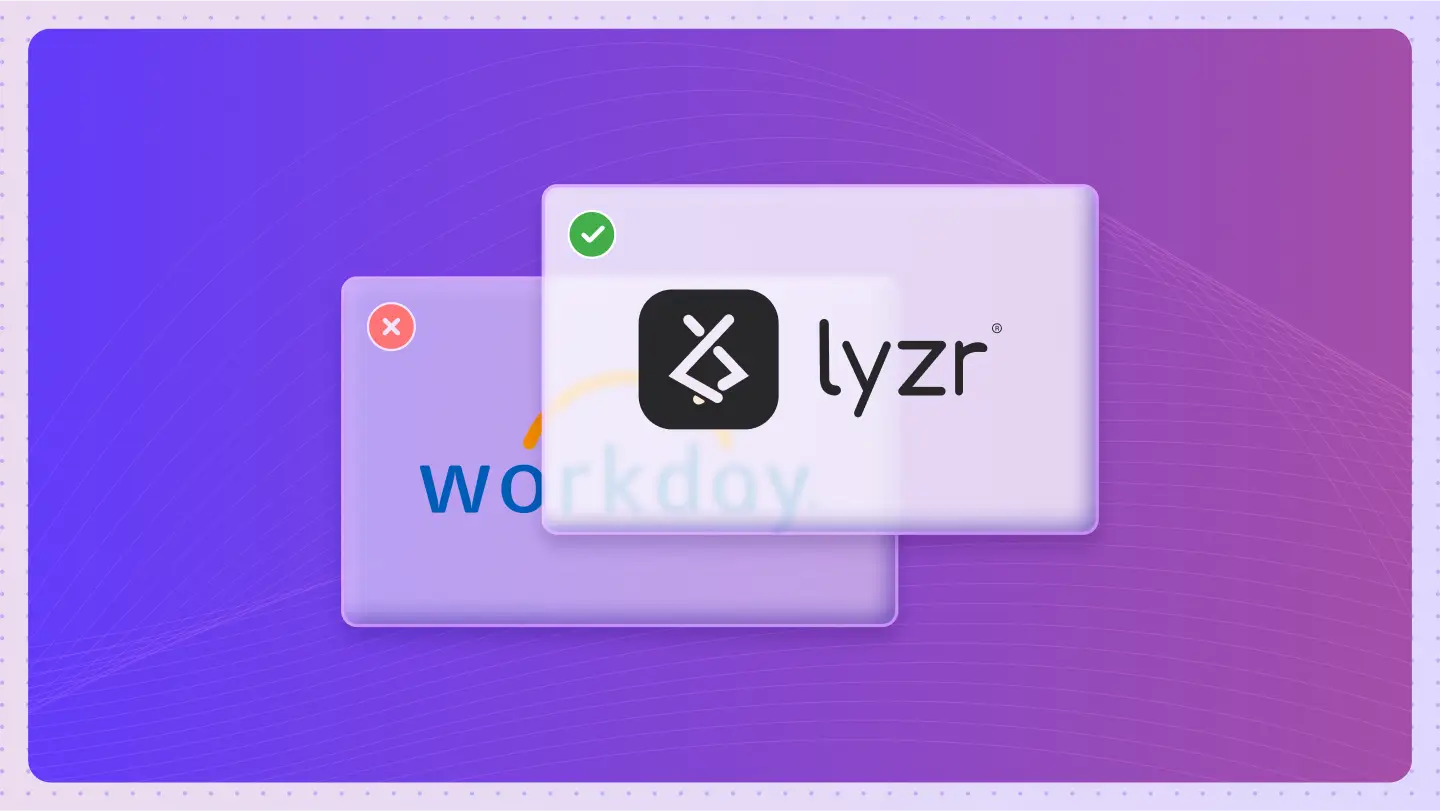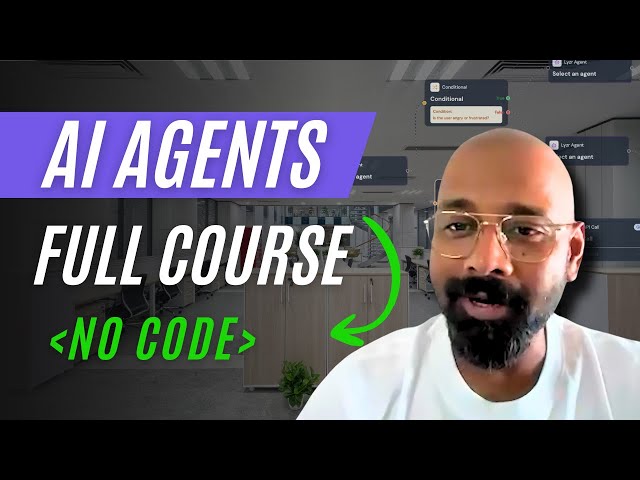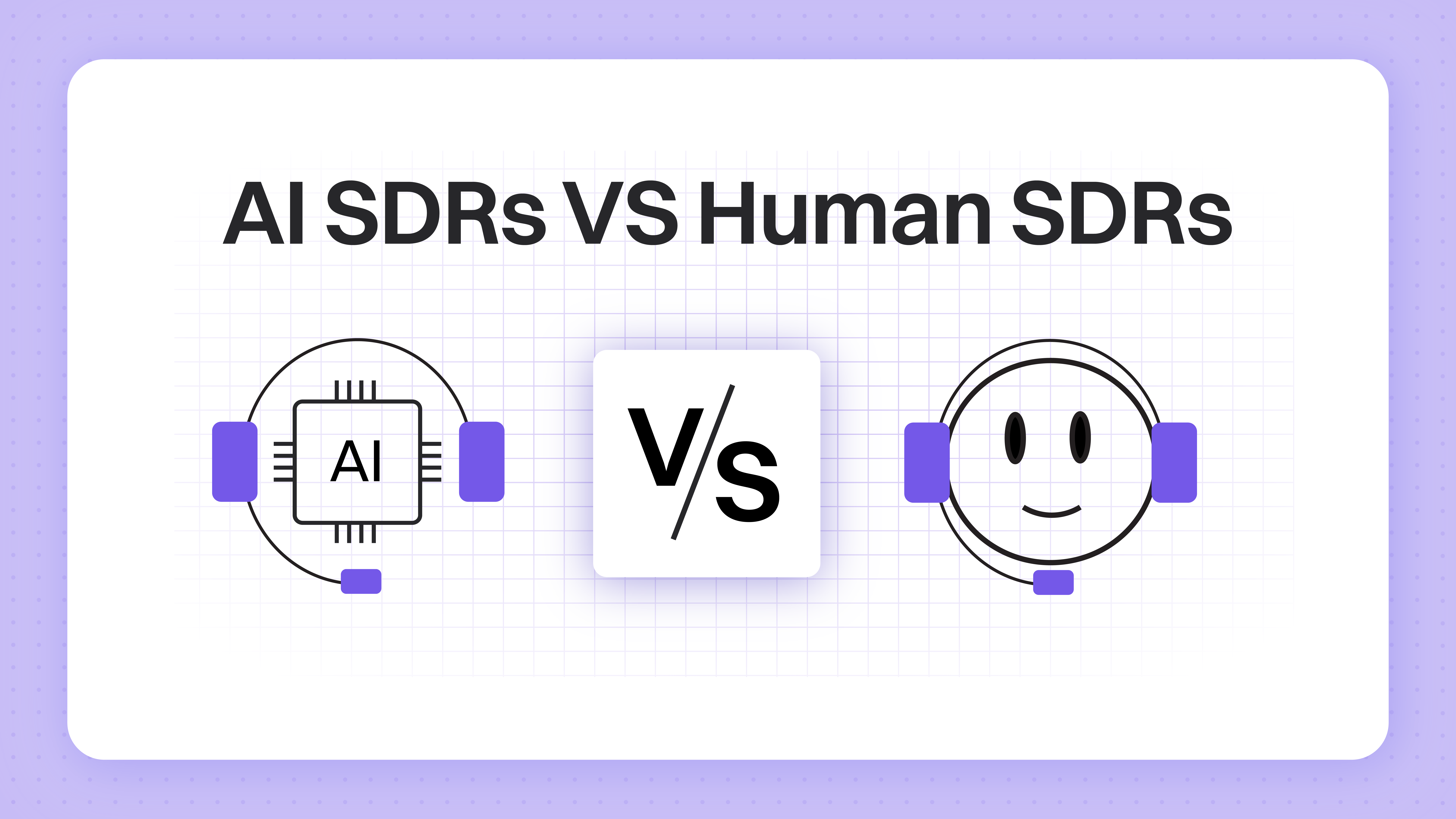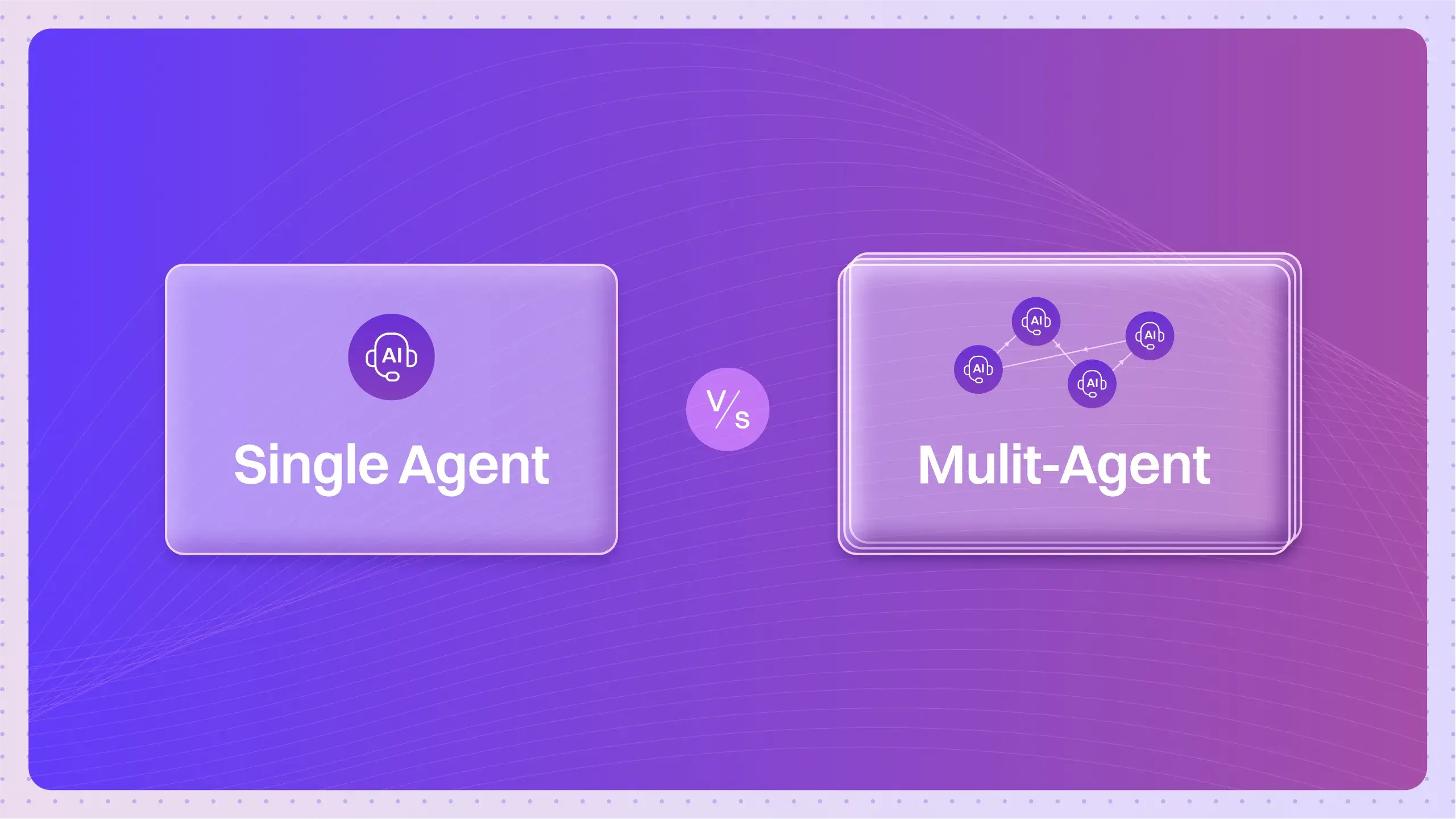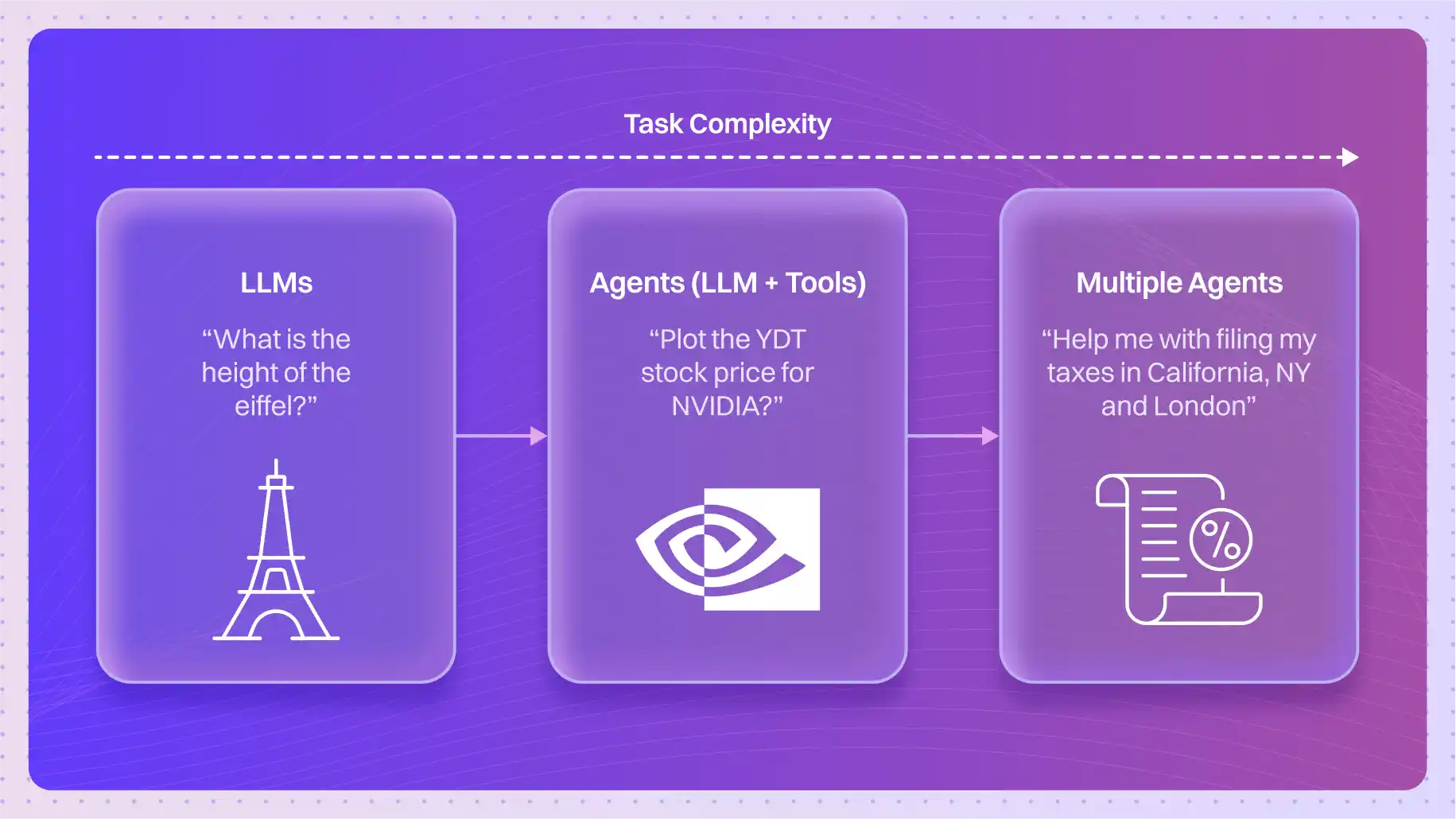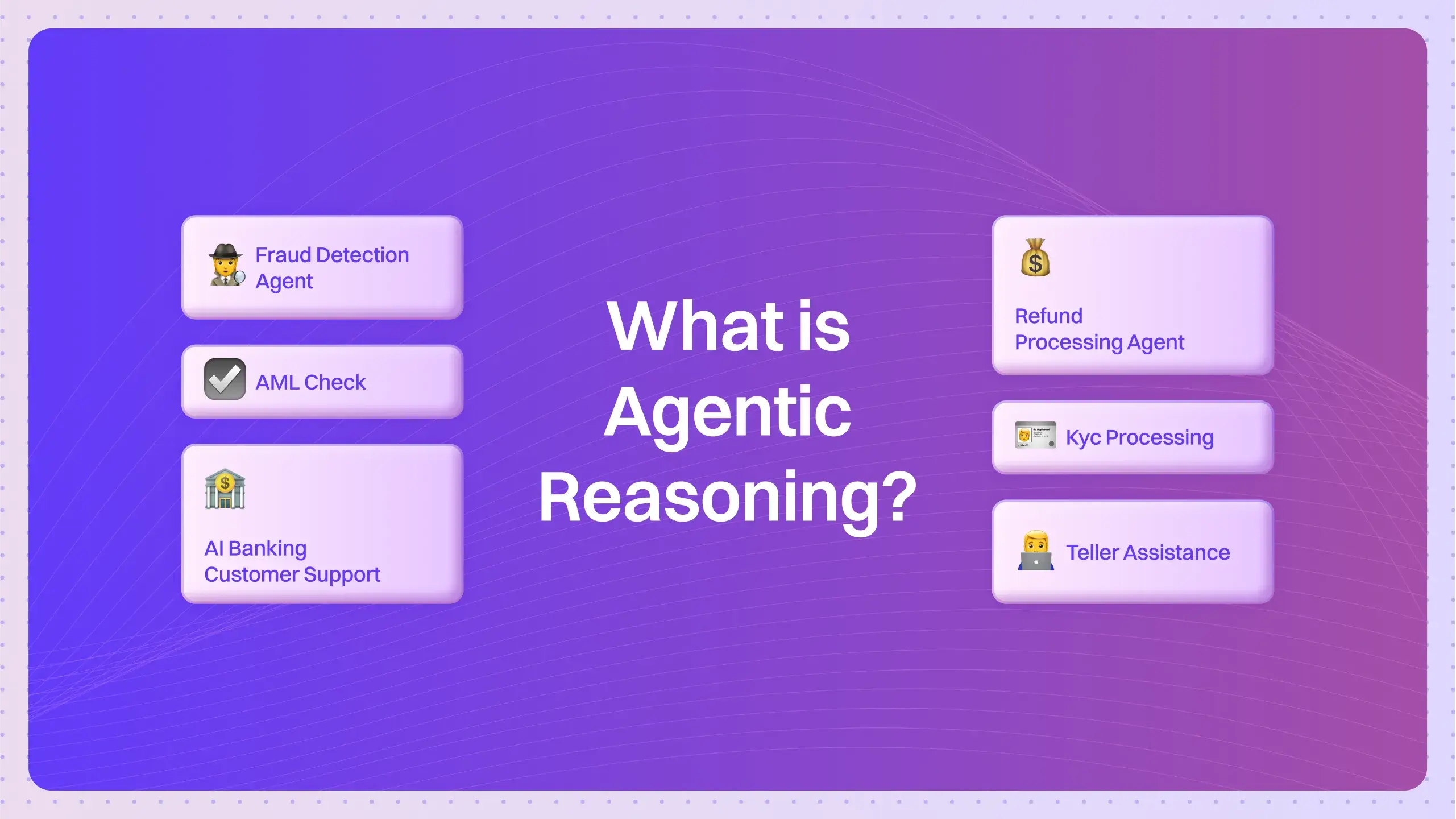Table of Contents
ToggleBusinesses rely heavily on SDRs, with over 50% of Chief Sales Officers highlighting outbound prospecting as a top priority.
But here’s the catch: traditional SDRs spend just 30% of their time on actual conversion conversations. The rest? Consumed by admin tasks, leaving high-value conversations, with a 40% conversion rate, making this resource tremendously underutilized.
This is where AI-powered SDRs step in, taking on repetitive tasks and giving human sales reps their time back to focus on relationship building and selling the product.
So it’s not a big surprise that some companies are asking, “Could AI replace human SDRs?”
But while AI boosts efficiency, it lacks the human touch, the trust and understanding that only people can bring.
So, what’s the best choice? Let’s find out.
AI SDRs vs Human SDRs: What is the Difference in Meaning and Role?
When you’re considering adding artificial intelligence to your sales team, you might wonder, “How does AI compare to human SDRs?”
Let’s break it down.
AI SDRs: The Benefits
- Speed up tasks: An AI sales agent, such as AI Sales Development Representatives (AI SDRs), handles repetitive tasks like cold outreach, follow-ups, and lead scoring quickly. These AI solutions automate outreach and manage follow-ups effectively. It takes care of the heavy lifting, allowing your team to focus on what matters.
- Ensure consistent messaging: With AI, every message follows the same script. There’s no risk of a message sounding off or inconsistent.
- Adapt and improve: AI constantly tracks its performance, adjusts on its own, and optimizes the process without needing manual intervention.
- Save on costs: Scaling your SDR team with AI doesn’t come with payroll or extensive training costs.
Example: Jazon your private AI SDR, can take over outbound prospecting and move your sales process forward faster.
The Meaning of a Human SDR: Unique Advantages
- Handle the unexpected: Humans excel when things don’t go as planned. They can make decisions in unpredictable situations, adapting as needed.
- Build personal connections: Human SDRs use emotional intelligence to engage leads and build trust, turning a conversation into a meaningful relationship.
- Read between the lines: Humans understand cultural nuances and can pick up on subtle cues in conversations that AI might miss, ensuring the human interaction feels natural.
But how do they really stack up against each other in practice? This video breaks down the debate:
How AI SDRs Amplify Sales Efficiency and Results
According to industry research, AI-driven sales activities are expected to account for 60% of the total sales process by 2028.
This trend highlights the significant benefits of AI in enhancing sales development representatives’ (SDRs) efficiency. Here’s why incorporating AI SDRs can elevate your sales strategy:
1. Automate and Scale Prospecting Efforts
Meeting monthly targets can be a challenge when human SDRs spend hours searching databases, gathering insights, and personalizing messages.
AI SDRs streamline these repetitive tasks through automation. From prospecting to follow-ups, they allow your human agents to focus on developing strategies and achieving success, scaling efforts without increasing the workload. For presentations and reporting, an AI PowerPoint generator can turn insights and data into visually engaging slides, saving time while keeping your team’s updates polished and professional.
2. Deliver Consistent Lead Experiences
Mistakes like misspelled names or missed follow-ups are common when SDRs juggle multiple responsibilities. AI SDRs eliminate such issues by maintaining consistency in every interaction.
They work tirelessly without breaks, ensuring every lead engagement is handled with accuracy and professionalism, enhancing the overall experience for prospects.
3. Leverage Data-Driven Outreach
Incorporating data-driven actions is key to effective sales outreach. AI SDRs excel in analyzing extensive datasets, identifying patterns, and taking timely actions that humans might miss.
For instance, AI can send follow-up messages when a lead repeatedly visits your website or engage prospects after significant activity on platforms like LinkedIn, ensuring outreach is timely and relevant.
4. Free Human SDRs for High-Priority Tasks
AI SDRs are designed to support your team, not replace them. By managing repetitive tasks, they help human SDRs concentrate on high-priority activities like relationship building and deal closure.
This division of tasks boosts efficiency, reduces workload stress, and ensures that your team delivers maximum value to your sales process.
AI SDR Stack and Features
AI SDRs offer a variety of features that simplify and speed up the sales process. Knowing what each feature does helps you pick the ones that best align with your sales goals. Let’s explore how these features can improve your sales efforts.
Core Components of an AI SDR Stack
An effective AI SDR is not a single tool but a sophisticated stack of interconnected technologies working in unison. Understanding these core components is key to choosing a platform that truly aligns with your sales objectives.
1. Data Enrichment and Intelligence
At its foundation, an AI SDR thrives on data. The platform automatically aggregates information from diverse sources to construct rich, detailed prospect profiles. This goes beyond basic demographics to include a company’s technology stack, recent funding rounds, relevant news, social media activity, and crucial intent signals that indicate a prospect is actively researching a solution like yours.
2. Outreach Automation Engine
The engine of the stack is its outreach automation capability. This component manages and executes multi-channel campaigns across email, LinkedIn, and other platforms. It powers automated follow-up sequences, offers deep integration with professional networks, provides customizable templates for personalization at scale, and uses A/B testing with intelligent send-time optimization to ensure every message has the maximum impact.
3. Natural Language Processing (NLP) for Human-like Communication
This is where the “intelligence” in AI becomes apparent. NLP allows the SDR to generate contextually aware messages, intelligently analyze inbound responses to understand intent, and even perform sentiment analysis to gauge a prospect’s emotional state. This enables the system to make real-time adjustments, ensuring communication feels relevant and personal, not robotic.
4. Advanced Analytics and Reporting
To drive continuous improvement, the stack includes a robust analytics module. This provides a clear dashboard view of campaign performance, tracking key metrics like engagement, response rates, and conversions. By analyzing the outcomes of A/B tests and measuring the overall return on investment (ROI), this component provides the data-driven insights needed to refine your strategy and maximize results.
How can AI SDRs help you scale Outbound Sales Without any additional resource burden?
| Capability | AI SDRs | Human SDRs |
| Speed | 1000+ contacts/day | 30-50 contacts/day |
| Response Time | Under 1 minute | 2-4 hours |
| Cost per 1000 Leads | $60 | $350 |
| Best Tasks | Data entry, follow-ups, scheduling | Complex deals, relationships |
| Working Hours | 24/7 | 8-10 hours |
| Lead Quality | High volume, lower conversion | Lower volume, higher conversion |
Prospecting and Planning: For sales development representatives, sorting through data, checking contact info, and organizing prospects can take a lot of time. This can slow down the sales process and lead to mistakes. AI SDRs help by quickly analyzing data, scoring leads, and finding the most promising prospects. With AI-powered tools, sales teams can save time and focus on building relationships with qualified leads.
Execution and Engagement: Human SDRs often juggle outreach, research, and crafting personalized messages. This can lead to missed opportunities or forgotten follow-ups. AI SDRs automate these tasks, ensuring that follow-ups are timely and personalized.
With natural language processing, AI sales agents can send messages that feel personal but don’t require a lot of effort. This helps sales teams scale their sales outreach while keeping that important human connection.
Optimization & Hygiene: Keeping everything organized in the sales funnel is important, but it’s also time-consuming. AI SDRs automate tasks like updating CRMs, managing pipelines, and adjusting cadences. This ensures that everything stays up to date, letting sales reps focus on meaningful conversations and closing deals.
By automating these repetitive tasks, AI SDRs improve the efficiency of sales development processes and help sales teams achieve better sales outcomes.
Understanding AI SDR Pricing vs. The Cost of Human SDRs
When evaluating the costs, AI SDR pricing is typically structured as a predictable monthly subscription, allowing you to scale outreach without the significant overhead associated with hiring. This contrasts sharply with the costs of human SDRs, which include salary, benefits, commissions, training, and management resources. An AI prospecting agent offers a more cost-effective solution for handling high-volume, top-of-funnel activities, providing a clear return on investment by lowering the cost per qualified lead.
Current Use Cases of AI SDRs
1. For Founders Looking for More Support With Low Budgets
As a founder, you’re probably wearing many hats, trying to find the right product-market fit, testing your sales strategy, and managing the sales process. But without a full sales team, it’s tough to balance everything. That’s where an AI sales agent comes in. These AI sales agents automate routine tasks like prospecting, outreach, and follow-ups. This gives you more time to focus on refining your product and building relationships with potential customers, while AI takes care of lead generation and sales outreach.
How AI SDRs Help:
- Problem: Limited budget, too much to juggle, and sales processes need automation.
- Solution: AI SDRs handle key tasks like outreach and lead qualification, freeing you up to focus on strategy and product development, while still engaging with qualified leads.
2. For Small Sales Teams (1-2 Sales Reps)
In a small sales team, reps often get bogged down with repetitive tasks, like building lists, sending follow-up emails, and qualifying leads. These tasks take time away from building relationships and closing deals. An AI sales agent, or AI Sales Development Representative (AI SDR), can automate much of this work, allowing sales reps to focus on what matters most: engaging with the most promising leads, having meaningful conversations, and ultimately closing deals.
How AI SDRs Help:
- Problem: Sales reps have too many routine tasks and not enough time for closing deals.
- Solution: AI SDRs handle the repetitive aspects of sales development, like lead scoring, follow-ups, and outreach, letting your team focus on building relationships and engaging with the most qualified leads.
3. For Sales Operations Handling Outreach Campaigns
Sales ops teams are often responsible for managing multiple outreach efforts, building lists, segmenting audiences, and sending personalized messages. This can lead to inconsistent sales processes and missed opportunities. An AI sales agent, powered by artificial intelligence, consolidates these tools into one AI-powered solution. They automate routine tasks, optimize outreach campaigns, and improve engagement through machine learning and natural language processing.
How AI SDRs Help:
- Problem: Sales ops teams deal with fragmented tools, inconsistent outreach, and a lack of automation.
- Solution: AI SDRs streamline the sales outreach process, ensuring data-driven insights, consistent messaging, and automation of routine tasks like follow-ups and meeting scheduling.
4. For Sales Agencies Handling Multiple Clients
Sales agencies that manage outreach for multiple clients struggle with balancing high-volume outreach and human interaction. An AI sales agent makes it easier by automating the entire prospecting process, from lead generation to follow-up communications. This ensures that each outreach is personalized while allowing agencies to scale their services efficiently.
How AI SDRs Help:
- Problem: Struggling to balance personalized outreach with high-volume campaigns for multiple clients.
- Solution: AI SDRs automate lead generation, outreach, and follow-ups, enabling agencies to maintain quality and personal connections with each client while scaling their efforts.
Challenges with AI SDRs
1. Misalignment With Sales Goals
Choosing the wrong AI SDR tool can lead to wasted time and missed opportunities. If the AI doesn’t fully understand the nuances of a conversation, it can frustrate prospects and hurt the sales process.
- When the AI misinterprets a prospect’s tone or question, the conversation may feel too robotic, causing the prospect to lose interest.
- This leads to lost business and missed sales opportunities.
| Issue | Impact |
| Cookie-Cutter Messages | Sends the same email to everyone with a name swap |
| Missing Social Cues | Can’t pick up hints or read situations |
| Rigid Responses | Sticks to the script no matter what |
| Data Hunger | Falls apart without perfect contact info |
2. Maintaining CRM Data Quality
AI SDRs rely on accurate data to perform well. If your CRM data is outdated or incorrect, the AI tool will struggle, leading to mistakes and missed opportunities.
- Incorrect contact details can result in sending the wrong messages to the wrong people.
- This can damage your sales funnel and hurt the overall quality of your outreach, affecting sales outcomes.
3. Integration Complexities
Integrating an AI SDR tool with your existing sales workflows can be tricky. If the tool doesn’t work well with your CRM or other systems, you may face technical problems.
- If the AI tool can’t sync properly with your email system, follow-up messages may be delayed or missed.
- These issues can lead to missed leads and lost opportunities.
| Challenge | Details |
| AI Knowledge Gap | Sales teams don’t get AI |
| Messy Data | B2B contact lists need work |
| Team Resistance | People fear losing jobs |
| ROI Questions | Hard to track success |
How Jazon Bridges the Gap
Addressing the challenges of AI SDRs requires a solution that balances automation with the human touch, this is where Jazon, your first private SDR, comes into picture.
With Jazon, you can:
- Expand Outreach: Automate connections while keeping interactions personal.
- Make Emails Relevant: Create tailored messages that grab attention and engage prospects.
- Track Actions: Monitor how leads interact to send follow-ups at the right time.
- Simplify Follow-Ups: Automate follow-ups to keep communication smooth and consistent.
- Focus on Building Relationships: Free up your team to spend more time on meaningful conversations.
Jazon makes it easy to tackle AI SDR challenges by combining efficiency with a personal touch.
Here’s a look at how Jazon balances automation with a human-like touch to solve these challenges:
Balancing AI and Human Expertise
How AI and human SDRs can work as a team to boost your sales: A Quick Look
| AI Does | Humans Do |
| Lead scoring | Sales conversations |
| Basic email outreach | Building relationships |
| Data crunching | Problem-solving |
| Meeting setup | Strategic planning |
| CRM management | Personal connections |
1. Leverage AI to Simplify, Not Replace
AI can take over repetitive tasks and provide helpful data insights, but it shouldn’t replace human sales reps. The key is to use AI as a tool to enhance the work of human teams, not replace them.
- AI can automate lead scoring, outreach efforts, and follow-up emails, but the human touch is crucial for building relationships and handling complex sales calls.
- By letting AI handle the routine work, sales teams can focus on what they do best, closing deals and building real connections.
2. Prioritize Quality Over Quantity
When it comes to outreach, AI can generate messages quickly, but not all content is created equal. Instead of mass-producing generic messages, focus on crafting targeted, relevant content.
- AI insights can help sales teams personalize their approach based on prospect data, but human intuition is what makes the connection meaningful.
- Combining AI-powered insights with human expertise ensures that each message counts, creating stronger connections with the most promising leads.
3. Invest in Training Programs
Sales teams need to develop the skills to work alongside AI tools. Training should focus on areas like data analysis, critical thinking, and adaptive communication, enabling reps to make the most of AI insights while keeping the personal touch that’s so important for closing deals.
- When sales reps understand how to use AI-generated data effectively, they can adapt their strategies to fit the unique needs of each prospect.
- With the right training, sales teams can strike the perfect balance between AI tools and human relationship-building.
Why Jazon is the Future for Every Industry?
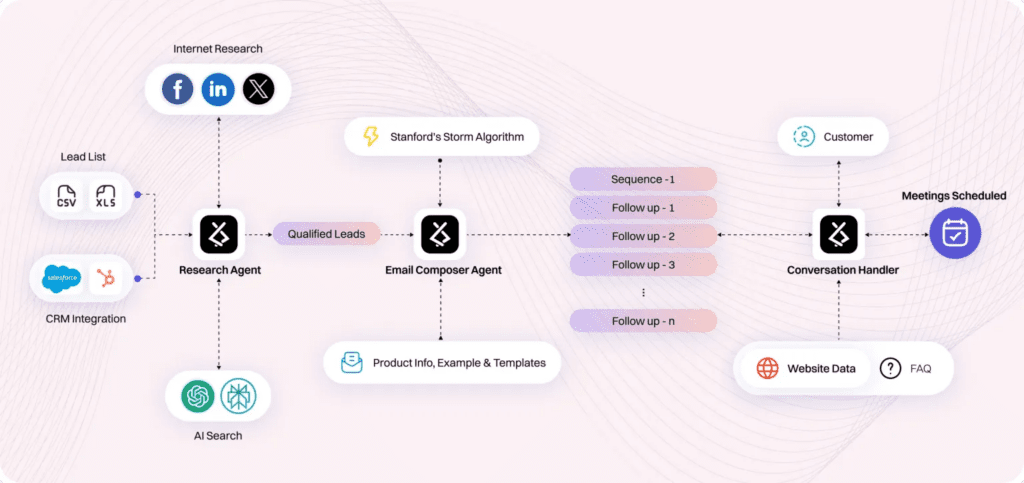
The debate between AI SDRs and human SDRs or the regular old sales team is not about choosing one over the other; it’s about understanding how they can complement each other in the sales process.
AI tools like Jazon can bring efficiency, scalability, and data-driven insights, while human SDRs or sales reps can offer empathy, relationship-building skills, and adaptability.
By leveraging the strengths of both, businesses can create a more effective sales strategy that maximizes meeting bookings and ultimately drives revenue.
For organizations looking to enhance their sales development efforts, tools like Jazon by Lyzr AI can provide the perfect blend of AI capabilities and human touch, ensuring that no lead is left behind and every opportunity is maximized.
Ready to design your own AI-augmented sales team? Our Sales Playbook provides detailed workflows and strategies to get you started.
Feel Free to Book a Demo to see how Lyzr AI can fulfil the gap for you.
Frequently Asked Question
1. What is the core difference in the AI vs Human SDR debate?
The core difference is not about replacement but collaboration. A human SDR excels at building deep personal connections, handling unpredictable conversations with emotional intelligence, and closing complex deals. In contrast, an AI SDR’s meaning is rooted in efficiency, automating repetitive tasks like prospecting and follow-ups 24/7. Solutions like Jazon by Lyzr AI are designed to handle this high-volume work, freeing human SDRs to focus on the high-value, relationship-driven conversations that lead to higher conversion rates.
2. What is the meaning of a human SDR’s role when an AI prospecting agent exists?
The meaning of a human SDR’s role becomes more strategic when an AI prospecting agent is introduced. While an AI agent manages outreach and initial qualification at scale, the human SDR becomes the crucial relationship builder and problem-solver. They engage qualified leads that are ready for a nuanced, empathetic conversation, interpreting subtle cues and building the trust that AI cannot replicate. This synergy allows human SDRs to focus purely on high-conversion activities, making their role more valuable.
3.How should I think about AI SDR pricing compared to hiring human SDRs?
AI SDR pricing is typically a scalable subscription model, making it a predictable operational expense, whereas hiring human SDRs involves significant costs in salary, benefits, and training. For example, platforms like Jazon offer a far more cost-effective way to handle thousands of leads compared to the high cost-per-lead associated with manual human effort. This allows you to scale your outbound sales operations efficiently without a proportional increase in your budget or headcount.
4. In the context of sales, what does the sdr meaning in AI translate to?
In AI, SDR (Sales Development Representative) translates to an autonomous software agent designed to perform the top-of-funnel tasks of a human SDR. The AI SDR meaning is centered on automating and scaling prospecting, lead qualification, and initial outreach. Using technologies like Natural Language Processing, these systems can send personalized emails, manage follow-ups, and even book meetings, ensuring the sales pipeline remains consistently full without manual intervention.
5. Considering the debate of AI SDRs vs human SDRs, how does a solution like Jazon fit in?
In the AI SDRs vs human SDRs discussion, a solution like Jazon by Lyzr AI serves as the perfect bridge, combining the strengths of both. It automates the high-volume, repetitive tasks that consume up to 70% of a human SDR’s time, such as initial outreach and follow-ups. This allows your human SDRs to dedicate their expertise to what they do best: building meaningful relationships, handling complex negotiations, and closing deals. Jazon ensures efficiency and scale, while your team provides the essential human touch.
Book A Demo: Click Here
Join our Slack: Click Here
Link to our GitHub: Click Here

